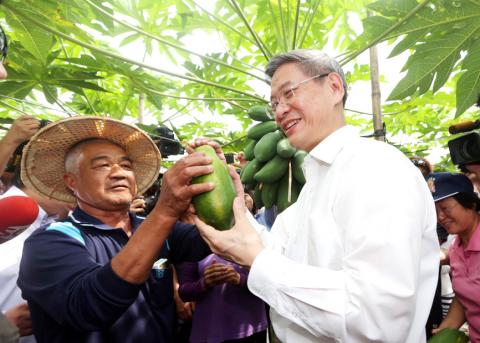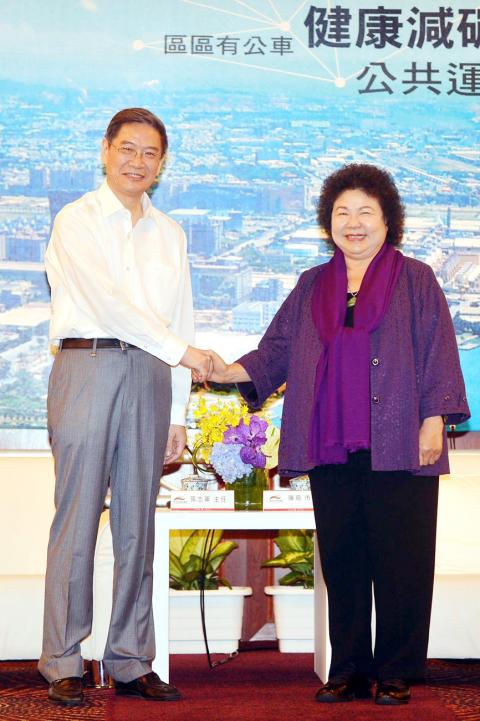China’s top Taiwan policymaker yesterday said that Beijing respects the “social system and lifestyle” that Taiwan has “chosen” as well as the “values and ideas” Taiwanese have embraced, but stopped short of saying whether it also respects the right of Taiwanese to make their choices about the nation’s future.
Taiwan and China have taken different paths in development, but they still share a common history, China’s Taiwan Affairs Office (TAO) Minister Zhang Zhijun (張志軍) told reporters after his 40-minute closed-door meeting with Greater Kaohsiung Mayor Chen Chu (陳菊) at a hotel in the city.
“We understand that Taiwanese cherish the social system and lifestyle that they have chosen. The mainland [China] respects the social system, values, ideas and lifestyles Taiwanese have chosen,” Zhang said when he gave the press a rundown of his conversation with Chen.

Photo: CNA
Asked about Zhang’s remarks at a separate setting, Chen relayed what Zhang said at their meeting.
“He [Zhang] was of the opinion that mainland China has repeatedly said on various occasions that it respects the lifestyle of the Taiwanese within the current liberal democratic system,” she said.
Chen said she told Zhang that he should regard the protests he has encountered in Taiwan as “normal,” because they are part of Taiwan’s democratic system, adding that she appreciated Zhang’s understanding of the situation.

Photo: AFP
Asked whether Zhang’s remarks suggest that Beijing would revise the statement TAO spokesperson Fan Liqing (范麗青) made prior to Zhang’s arrival — that the future of Taiwan should be decided by all Chinese, including “compatriots” in Taiwan — Chen said the question was not addressed at the meeting.
“But I told him that the recent remarks made by the TAO were not acceptable to the ruling and opposition parties in Taiwan,” said Chen, a member of the Democratic Progressive Party.
Zhang’s remarks echoed what Chinese President Xi Jinping (習近平) said in February when he met with former vice president and Chinese Nationalist Party (KMT) chairman Lien Chan (連戰) in Beijing.
Zhang also told reporters that Beijing welcomes people from all walks of life in Taiwan to engage in the peaceful development of cross-strait relations, regardless of which city or county they come from, and no matter what their political affiliation or religious beliefs are.
Asked about the prospects of the DPP conducting exchanges with Chinese authorities after Zhang’s visit, Chen said: “What the future holds for us will take its course.”
“What we need to do now is to foster mutual understanding and respect for each other,” she said.
“As to whether there will be more high-level exchanges between the two sides, I can only say: Each side has extended an olive branch and is more likely to get to know each other,” Chen said.
Several DPP members, including former legislator Julian Kuo (郭正亮), have sought to freeze the “Taiwan independence clause” in its charter to remove what they see as a barrier to engagement with China.
Kuo, along with other academics, was at a closed-door meeting with Zhang on Thursday night in Taipei. He said that when he asked Zhang whether the Chinese Communist Party would be willing to engage in talks with the DPP if the party puts the clause on ice, Zhang replied that when they look at a party, they look beyond its charter to its policies and actions.
Chen said the clause was not brought up in her meeting.
Chen added that she told Zhang that China could consider increasing the number of cross-strait flights between Kaohsiung International Airport and cities in China.
They also talked about exports of Taiwanese agricultural and aquatic products to China and the opening of Taiwan to Chinese tourists, with Chen saying that nepotism and cronyism have plagued some businesses, which benefit only politicians, rather than fishermen, small businesses and ordinary people.
In Taipei, the Black Island National Youth Front and Democracy Kuroshio called on Chen, a former prisoner of conscience, to value human rights and take public demands into account.
“Be sure not to sacrifice Taiwan’s hard-won democracy for the sake of economic growth,” they said.
Zhang also met Mainland Affairs Council Minister Wang Yu-chi (王郁琦) for a chat over tea last night.
Wang said Zhang proposed that Taipei and Beijing begin political talks to resolve long-term disagreements.
Wang said he responded that the time was not ripe for political talks given the lack of public consensus on the issue. He added that he told Zhang that China should extend more olive branches to address long-term issues that concern Taiwanese.
Additional reporting by Alison Hsiao

CHAOS: Iranians took to the streets playing celebratory music after reports of Khamenei’s death on Saturday, while mourners also gathered in Tehran yesterday Iranian Supreme Leader Ayatollah Ali Khamenei was killed in a major attack on Iran launched by Israel and the US, throwing the future of the Islamic republic into doubt and raising the risk of regional instability. Iranian state television and the state-run IRNA news agency announced the 86-year-old’s death early yesterday. US President Donald Trump said it gave Iranians their “greatest chance” to “take back” their country. The announcements came after a joint US and Israeli aerial bombardment that targeted Iranian military and governmental sites. Trump said the “heavy and pinpoint bombing” would continue through the week or as long

TRUST: The KMT said it respected the US’ timing and considerations, and hoped it would continue to honor its commitments to helping Taiwan bolster its defenses and deterrence US President Donald Trump is delaying a multibillion-dollar arms sale to Taiwan to ensure his visit to Beijing is successful, a New York Times report said. The weapons sales package has stalled in the US Department of State, the report said, citing US officials it did not identify. The White House has told agencies not to push forward ahead of Trump’s meeting with Chinese President Xi Jinping (習近平), it said. The two last month held a phone call to discuss trade and geopolitical flashpoints ahead of the summit. Xi raised the Taiwan issue and urged the US to handle arms sales to

State-run CPC Corp, Taiwan (CPC, 台灣中油) yesterday said that it had confirmed on Saturday night with its liquefied natural gas (LNG) and crude oil suppliers that shipments are proceeding as scheduled and that domestic supplies remain unaffected. The CPC yesterday announced the gasoline and diesel prices will rise by NT$0.2 and NT$0.4 per liter, respectively, starting Monday, citing Middle East tensions and blizzards in the eastern United States. CPC also iterated it has been reducing the proportion of crude oil imports from the Middle East and diversifying its supply sources in the past few years in response to geopolitical risks, expanding

An Emirates flight from Dubai arrived at Taiwan Taoyuan International Airport yesterday afternoon, the first service of the airline since the US and Israel launched strikes against Iran on Saturday. Flight EK366 took off from the United Arab Emirates (UAE) at 3:51am yesterday and landed at 4:02pm before taxiing to the airport’s D6 gate at Terminal 2 at 4:08pm, data from the airport and FlightAware, a global flight tracking site, showed. Of the 501 passengers on the flight, 275 were Taiwanese, including 96 group tour travelers, the data showed. Tourism Administration Deputy Director-General Huang He-ting (黃荷婷) greeted Taiwanese passengers at the airport and